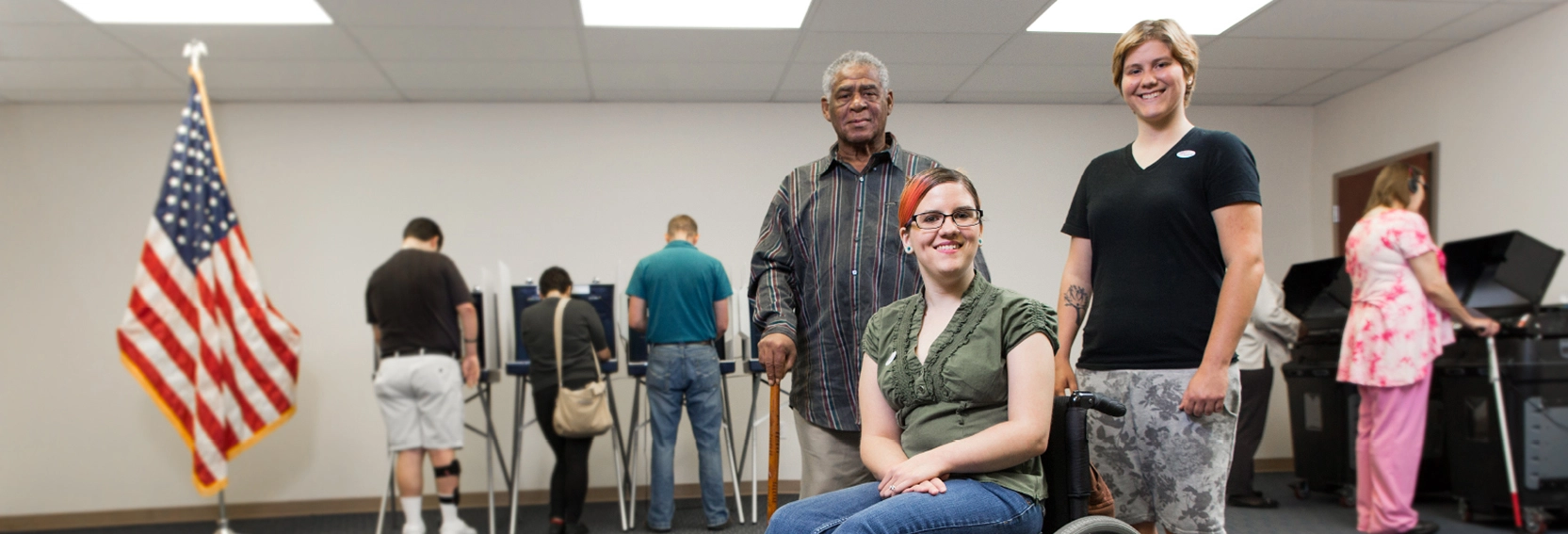The world today is radically different in many ways than at anytime in history. There is a worldwide pandemic caused by COVID-19, and in the U.S. the struggle for civil rights and equality is once again taking center stage. The power of the vote has never meant more than it does at this moment. One group whose voice often goes unheard is the disability community; and the American Association of People with Disabilities (AAPD) is determined to change that.
In late June, AAPD hosted an event titled “POWER: the Disability Vote”. This event was a national, nonpartisan disability and election virtual summit. Over 800 live viewers tuned in for panels, presentations, and a national call-to-action to mobilize disability voters and allies. This summit was originally slated to take place in early January as a presidential candidate forum but was rescheduled for June due to several factors outside of organizers’ control. Over the two-day summit, different voting-related issues were discussed such as voter suppression, ways to engage local election officials, and strategies for building a disability voting coalition in states where there isn’t yet one.
The summit began with a session that outlined the impact the disability vote could have on the American political process. Drs. Lisa Schur and Douglas Kruse – both from the University of Rutgers – explained that if everyone in the disability community and their allies voted during the 2016 elections that it would have accounted for as much as 25% of the total vote. As Schur and Kruse emphasized, this fact itself demonstrates the importance of disability voting communities engaging the election process in 2020.
This session was followed by a panel on voter suppression that was moderated by Michelle Bishop of the National Disability Rights Network (NDRN). On this panel there were representatives from the American Foundation for the Blind, Bazelon Center for Mental Health Law, the National Council on Independent Living (NCIL), Self-Advocates Becoming Empowered (SABE), Communication Services for the Deaf, and SignVote. Panelists were asked to discuss their opinions on the biggest obstacle that disabled voters will encounter in the 2020 elections. Although these groups understandably discussed a wide variety of issues facing voters with disabilities, one common thread was the importance of providing voters with accessible information in numerous formats. Some panelists described the need to provide such information in an unbiased and inclusive manner to voters with disabilities. Similarly, there was discussion about the need for privacy and independence for both in-person, absentee, or vote-by-mail balloting and the need for states to provide accessible options for each for all voters. Finally, this panel took time to discuss other key issues including ways to prevent voter suppression against people of color including disabled people of color especially considering the racial and social justice movements occurring nationally and internationally.
Another panel at the summit focused on the importance of local and state elections. On the second day, there was a panel devoted to discussing ways to build a disability voting rights coalition. One of Access the Vote Florida’s members, Debbie Dietz from Disability Independence Group, discussed how Florida went about formalizing a state chapter of AAPD’s “Rev Up!” campaign. “Rev Up!” stands for “Register! Educate! Vote! Use your Power!”, and Dietz explained how stakeholders in Florida began meeting to discuss issues surrounding voting with a disability ahead of the 2018 elections, and how this state coalition is continuing to meet and plan together. A separate panel discussed ways to engage with policymakers to increase the number of people with disabilities in elected office. This panel included representatives from the National League of Women Voters and the federal Elections Assistance Commission.
Along with these and other panel discussions, the summit included videotaped messages from presidential candidate Joe Biden as well as a member of President Donald Trump’s administration. The disability vote will have tremendous effects on the 2020 elections, and that these elections are crucial to not only disability communities, but to our nation as a whole. As the late Justin Dart (often regarded as the “father of the Americans with Disabilities Act, or the ADA) famously reminded others, the disability vote is extremely powerful and people should “vote as if your life depends on it – because it does!”
Jason Hahr is a freelance blogger who has spent the last 8 years covering social justice and disability issues. Jason holds dual Bachelor’s Degrees in history and drama, as well as a Master’s Degree in education, and assists with Access the Vote Florida’s social media management.
